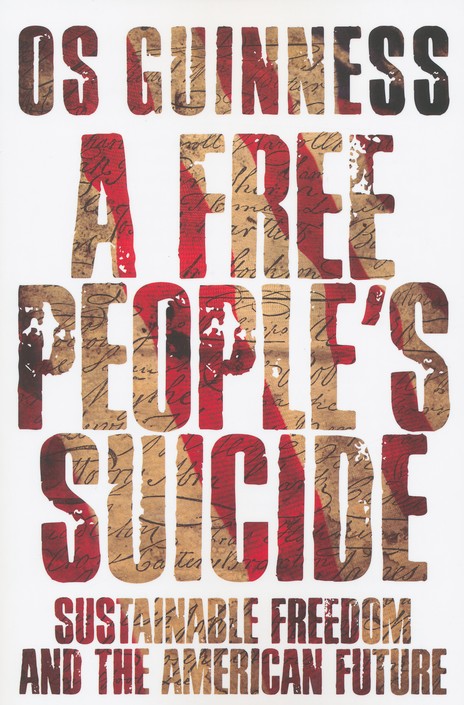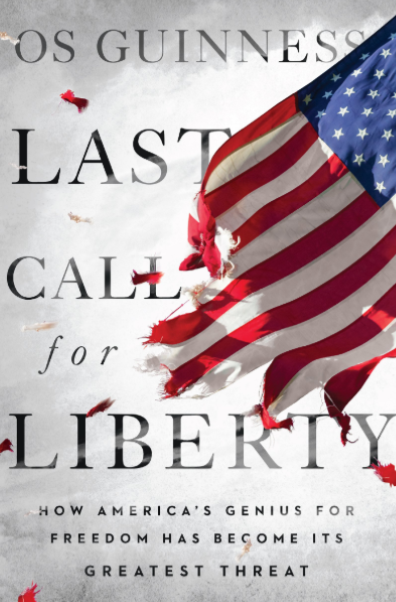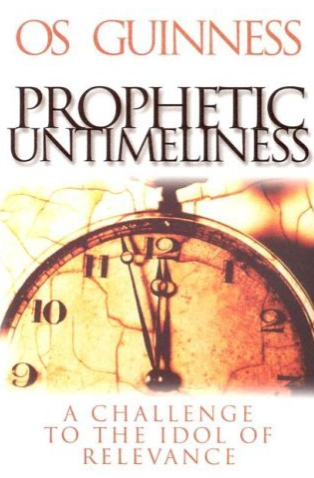You only live once―if then. Life is short, and it can be as easily wasted as lived to the full. In the midst of our harried modern world, how do we make the most of life and the time we have? In these fast and superficial times, Os Guinness calls us to consequential living. In strong contrast to both Eastern and secularist views of time, he reorients our very notion of history, not as cyclical nor as meaningless, but as linear and purposeful. In the Judeo-Christian tradition, time and history are meaningful, and human beings have agency to live with freedom and consequence in partnership with God. Thus we can seek to serve God’s purpose for our generation, read the times, and discern our call for this moment in history. Our time on earth has significance. Live rightly, discern the times, and redeem the day.

A Free People’s Suicide: Sustainable Freedom and the American Future
Nothing is more daring in the American experiment than the founders’ belief that the American republic could remain free forever. But how was this to be done, and are Americans doing it today?
It is not enough for freedom to be won. It must also be sustained. Cultural observer Os Guinness argues that the American experiment in freedom is at risk. Summoning historical evidence on how democracies evolve, Guinness shows that contemporary views of freedom–most typically, a negative freedom from constraint– are unsustainable because they undermine the conditions necessary for freedom to thrive. He calls us to reconsider the audacity of sustainable freedom and what it would take to restore it.
“In the end,” Guinness writes, “the ultimate threat to the American republic will be Americans. The problem is not wolves at the door but termites in the floor.” The future of the republic depends on whether Americans will rise to the challenge of living up to America’s unfulfilled potential for freedom, both for itself and for the world.

Last Call for Liberty: How America’s Genius for Freedom Has Become Its Greatest Threat
The hour is critical. The American republic is suffering its gravest crisis since the Civil War.Conflicts, hostility, and incivility now threaten to tear the country apart. Competing visions have led to a dangerous moment of cultural self-destruction. This is no longer politics as usual, but an era of political warfare where our enemies are not foreign adversaries, but our fellow citizens.
Yet the roots of the crisis are deeper than many realize. Os Guinness argues that we face a fundamental crisis of freedom, as America’s genius for freedom has become her Achilles’ heel. Our society’s conflicts are rooted in two rival views of freedom, one embodied in “1776” and the ideals of the American Revolution, and the other in “1789” and the ideals of the French Revolution. Once again America has become a house divided, and Americans must make up their minds as to which freedom to follow. Will the constitutional republic be restored or replaced?
This grand treatment of history, civics, and ethics in the Jewish and Christian traditions represents Guinness’s definitive exploration of the prospects for human freedom today. He calls for a national conversation on the nature of freedom, and poses key questions for concerned citizens to consider as we face a critical chapter in the American story. He offers readers a checklist by which they can assess the character and consequences of the freedoms they are choosing.
In the tradition of Alexis de Tocqueville, Guinness provides a visitor’s careful observation of the American experiment. Discover here a stirring vision for faithful citizenship and renewed responsibility, not only for the nation but also for the watching world.

Prophetic Untimeliness: A Challenge to the Idol of Relevance
The buzz among evangelicals today is about relevance and reinvention, about new ways of “doing church” through revising, innovating, borrowing, mixing, and experimenting. Yet, says Os Guinness, in our uncritical pursuit of relevance, Christians have actually become irrelevant. By our determined efforts to redefine ourselves in ways that are more in line with the modern world than are faithful to Christ, we have lost not only our identity but our authority and significance. Prophetic Untimeliness addresses this issue by giving practical, constructive solutions for living with integrity in the midst of modern pressures. Guinness explores what it means to be both faithful and relevant, and how to be truly relevant without being trivial or trendy. Readers will be challenged to develop “resistance thinking,” an approach inspired by C. S. Lewis that balances the uncomfortable truths of the gospel with the pursuit of relevance. Only by being true to Christ and living with integrity and wisdom will we meet the needs of a world that is hungry for some really good news.
